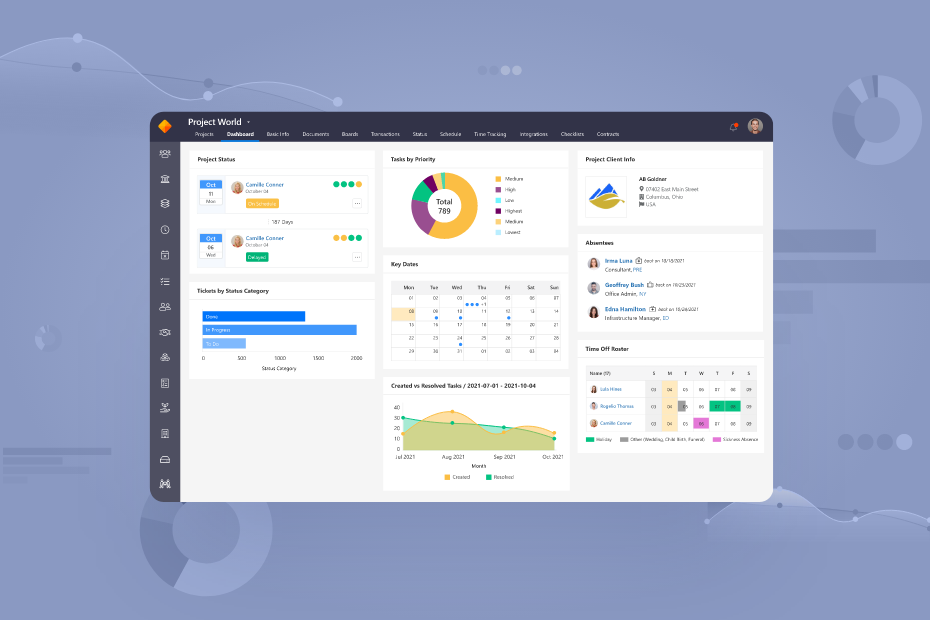
ERP applications are popular due to various features that help companies manage their departments like finance, marketing, sales, and HR.
Functionally rich, ERPs provide critical information across the entire organization. Ultimately, when a client signs into an ERP, they seek to glance at real-time data and gather everything they need in one look.
ERP dashboards are vital. You should ensure the ERP you select has rich functional data on project management. Dashboards help users’ access and view metrics regularly and gain insight into key performance indicators at any time. The information displayed in dashboards show analytic insights and helps make faster decisions.
What are ERP project management dashboards?
Dashboards help you quickly see a summarized view of specific performance data with relevant details. The dashboards visualization helps project managers and organization leaders get a quick snapshot view of a project, the performance of departments or any specific business area.
ERP project management dashboards show KPIs (Key Performance Indicator), which presents comprehensive data in pictorial, graph, and chart forms.
The way dashboards are used across multiple departments in an organization can vary. Your finance department may need a dashboard that shows some financial information on vendor payments, while the sales department may be interested in knowing the sales pipeline status.
Dashboards can be customized as per needs based on available data. Access to dashboards can also be restricted. For example, dashboards that show financial information and profitability can be made accessible to only a few people in the organization. The clients can also have access to another dashboard that may have limited information.
Read on: Have you properly defined your KPIs to your best advantage?
Using ERP project management dashboards
Project management has a lot of aspects that need to be tracked. Here's where dashboards come in handy.
Project managers and organization leaders can view the project status and see if a project is on track. ERP project management dashboards can show insights into project schedules.
A dashboard can show if the project is on schedule or whether its behind schedule and has issues that need to be addressed. You can have a dashboard on important project metrics like expenses. The dashboard can show a graphical representation of a comparison between the planned costs planned against the actual expenses.
You can also have dashboards on multiple project management elements like staff, the assigned tasks, their progress status, staff holiday schedule, and many more.
Features of a good project management dashboard
Project management dashboards should enable your staff to make faster decisions by providing relevant data. Ensure ERP project management dashboards include the following:
Comprehensiveness
A project management dashboard collects data and shows it in a summarized view so that there are relevant takeaways with a single view.
Ideally, it should reflect data points in real-time in order to make data-driven decisions. A dashboard that lacks an adequate coverage of data points will provide incomplete information that can hamper the proper flow of information to the team and lead to poor decisions.
Clarity in data
A project management dashboard should collect data scattered across various data sources and present it so that the team can easily understand whether it’s a positive or negative reflection of the data parameter.
Actionable insights have to be visually clear from the dashboard visually.
Flexibility and drill-down features
Project management dashboards should be customizable as one dashboard cannot suit all the needs as each project or team will have different information needs. Flexible configurations are essential and the options to drill down into deeper details would also be helpful.
Benefits of ERP project management dashboards
Simplify complicated data
ERP dashboards present essential information to users in a simplified manner so that they can quickly check and gain actionable insights. Information seen in bulk can be complicated and challenging to understand by everyone in the company. Dashboards show data in charts, graphs, and other pictorial forms that help provide quick, actionable insights.
Tracking business and project operations
It tends to be challenging to track progress and status with data across departments and the organization. With ERP dashboards, leaders and teams can quickly identify the progress in real-time and know the areas that need improvement. Without a dashboard it can be time-consuming to extract insights from data which could mean missing out on opportunities.
Improving team efficiency
Efficiency can only be achieved when stakeholders and teams are aware of what’s going on in the company. Team meetings are a good way of communicating, but that only works for a short period of time. There’s a need to give space to a platform that prevents a communication gap. With ERP dashboards, representatives can see what's happening in their departments and figure out what steps they need to take to complete a task. A dashboard shows in-depth insights in real-time.
Dashboards streamline Business Intelligence and reporting
Dashboards with a continuous flow of real-time information are a fundamental part of today’s ERPs. ERP project management dashboards show analytical information by combining various business intelligence applications and reporting systems. Integrations make it possible to offer intelligent and detailed actionable insights.
Read on: Introduction to Vault's integrations
Explore Vault’s project management dashboards
Vault is a cloud-based ERP that offers insightful and comprehensive project management dashboards that shows information across your entire organization.
Sign up for a free demo and see how Vault’s project management dashboards give you a 360-degree view of your organization’s projects.
.png)